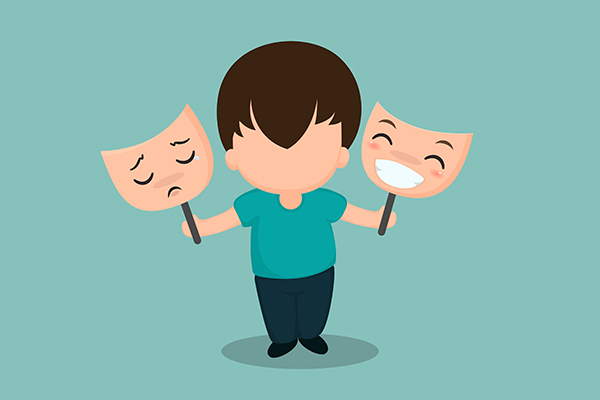What Are the Symptoms of Bipolar Disorder?

Also known as manic disorder, bipolar disorder is a health issue that leads to extreme mood swings that include lows (depression) and highs (mania). During the low phase, you feel hopeless and lost as your ability to derive pleasure from most activities goes away. During the mania or less extreme hypomania phase, you are full of energy, euphoric, and you might be more irritable than usual.
The constant mood swings caused by bipolar disorder can affect your ability to think clearly as well as your behavior, judgment, activity, energy, and sleep. These episodes of mood swings might be a rare occurrence, or they might occur frequently. They might also be accompanied by emotional symptoms.
Bipolar disorder is typically a lifelong condition for most people, but the mood swings and other symptoms that accompany the condition can be treated with psychotherapy and medication.
Symptoms of bipolar disorder
There are different types of bipolar disorders and they might come with symptoms like depression, hypomania, or mania. These symptoms can lead to unpredictable changes in a person’s behavior, negatively impacting their relationships, professional life, and quality of life.
The condition can develop at any age, but it is typically diagnosed during a person’s teenage years. Let us take a close at the symptoms of the different stages of a bipolar episode:
Hypomania and mania
These are two distinct types of bipolar episodes, but their symptoms are the same. Mania is the more severe of the two, and it is more likely to affect a person’s behavior at school, work, or social activities. Mania can also lead to a person losing touch of reality, requiring hospitalization.
Hypomanic and manic episodes are often accompanied by symptoms like:
- Feeling wired, jumpy, or abnormally upbeat
- Decreased need for sleep
- An exaggerated sense of confidence and well-being
- Increased agitation, energy, or activity
- Racing thoughts
- Being easily distracted
- Talkativeness
- Poor decision-making – like foolish investments, sexual risks, or buying sprees
Depressive episode
A depressive bipolar episode comes with symptoms that are severe enough to impact a person’s regular activities like school, work, relationships, and social activities. A major episode comes with at least five of these symptoms:
- Depressed mood – feeling empty, sad, hopeless, or tearful
- Inability to derive pleasure and a lack of interest in most activities
- Drastic unplanned weight gain or weight loss or an increase or decrease in appetite
- Sleeping too much or insomnia
- Slowed or restless behavior
- Loss of energy or fatigue
- Excessive feeling of guilt or feelings of worthlessness
- A decreased ability to concentrate
- Indecisiveness
- Suicidal thoughts
The symptoms of some types of bipolar disorder might include other issues like anxiety, psychosis, melancholy, or distress. Identifying symptoms of bipolar disorder in children and teenagers can be challenging since these symptoms sometimes manifest themselves differently. Diagnosing teenagers in particular since it is hard to differentiate between the normal ups-and-downs of being a teenager and the symptoms of bipolar disorder and other health issues.
Take control of your health
Think you or a loved one might have bipolar disorder? Give us a call or stop by our New York clinic to set up an appointment with our psychiatrist.
Request an appointment here: https://nycpsychiatricassociates.com or call NYC Psychiatric Associates at (917) 391-0076 for an appointment in our New York office.
Check out what others are saying about our services on Yelp: Read our Yelp reviews.
Related Posts
While there is no cure for many long-term behavioral disorders, they may be successfully controlled with the right combination of therapy and other treatments. Behavioral issues such as obsessive-compulsive disorder, attention deficit hyperactivity disorder, and addiction disorders are prevalent nowadays.While there has been a lot of study into what causes behavioral disorders, including diverse fields…
Depression treatment can vary from patient to patient. However, all psychiatrists approach each patient with some basic techniques. These strategies can guide you through your depression treatment. Here are the details on how each mental health provider can guide you through your condition.The psychiatrist can prescribe antidepressants. These drugs can help correct the uneven chemistry…
Professional schizophrenia treatment is necessary due to the complexity of the mental health disorder. Psychiatrists characterize it as a range of hallucinations, delusions, jumbled thinking patterns, and sometimes a loss of emotional resonance or expressiveness. These are just some of the symptoms that make trying to manage the disorder independently nearly impossible and dangerous.Before developing…
Treatment-resistant depression is a leading reason patients seek antidepressant alternatives, but it is far from the only reason. Though typically a first-line treatment, antidepressants are not the only option and are not right for every patient. The following are some reasons these drugs may not work for you and alternative therapies a psychiatrist might recommend.In…


